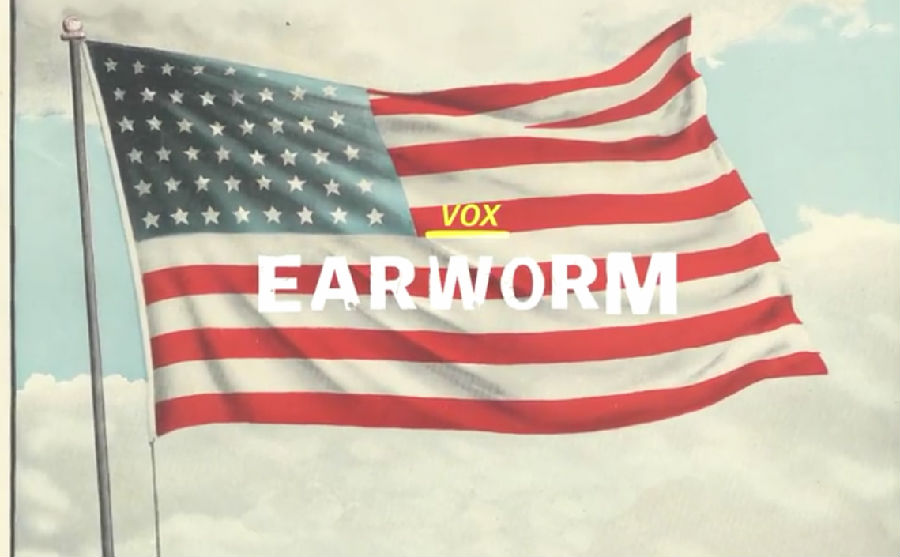(单词翻译:单击)
What so proudly we...sailed?
我们对着什么……航行?
If you’ve ever tried to sing the star spangled banner, “You see”
如果你也曾试图唱《星条旗之歌》,“看见”
You know it’s not easy. “And the rockets’ red glare. Can’t go that high.”
你就知道这首歌不好唱。“火炮闪闪发光。唱不上去了。”
The lowest note and the highest note are an octave and a half apart.
因为这首歌的最低音和最高音之间差了八度半音。
That’s 12 full notes.
也就是12个全音音符。
For comparison, God Save The Queen spans seven notes.
相比之下,《天佑女王》最高音和最低音之间的音程只有七个全音。
O Canada? It’s nine.
《噢!加拿大》呢?九个。
Yes exactly, Estelle, this is why we need a new national anthem.
是的,没错,Estelle,所以我们才需要换首国歌啊。
What? No. Joss, this is why the national anthem is so great.
什么?不是的,乔斯,这恰好是我们的国歌厉害的地方。
No no no, the French anthem, that’s great. And it’s got a range of nine notes.
不不不,法国的国歌才叫厉害。它的音程也只有九个全音。
Nine notes is enough to make Yvonne cry in Casablanca.
九个全音已经足以让《卡萨布兰卡》Yvonne闻之哭泣了。
“Viva La France!!”
“法兰西万岁!”
But 12 notes? That just feels like failure.
12个全音?听着只会让人感觉很失败。
I know the words to it, but I’m so aware of how bad I sound that, like I have to stop right now.
我记得歌词的,但是我很清楚自己唱得有多难听,真的是唱不下去了。
Ok so it’s not just the overall range, the whole song feels like it’s trying to lose us, starting with the first line.
而且,这首歌不仅整体来看很难唱,而且从第一句开始就会让人有种唱不下去的感觉。
“So you go ‘Oh say can you see.’
“一开始是'哦,你可看见,'
I've already traversed an octave from ‘say’ to ‘see’
从'你'到'见'就已经是一个八度了。
That’s music theory expert Paula Telesco.
这位是乐理专家Paula Telesco。
But from ‘see’ I have to go up to ‘by the.’
但从'见'接着要唱到'透过'这么高。
So now I've traversed a 10th, and we're only in the second measure.
现在我已经高了10个音了,而且这还才到第二个阶段。
And then right here, you’re also hit with a chromatic note,
这里还有一个变化音符,
which means it’s not in the same key that the rest of the notes are in.
意思就是说它还不跟这个乐句里的其他音符在同一个调上。
And that comes right after this dive.
而且这个音还是紧跟在这个降调后面的。
An “Interval” is the distance between two notes.
“音程”指的是两个音符之间的距离。
If they’re right next to each other, they’re called “steps.”
如果两个音符彼此相邻,它们就被称为“全音”。
Most music moves by step, meaning a smaller percentage of skips.
大多数曲子的音高变化都是以全音为基础的,这也就意味着很少会有跳跃式音符。
But the star spangled banner is full of skips, including fourths, fifths, sixths, a tenth!
然而,美国的国歌里到处都有这种跳跃式音符,包括四度、五度、六度、十度!
So you know it's kind of treacherous.
看出来这首歌奸诈了吧。
That’s why music teachers in the 30s opposed the law that officially made the star spangled banner our national anthem.
这就是为什么30年代的音乐教师反对法律将这首歌作为我们的国歌了。
And a writer in the 1920s said that “No one with a normal esophagus can sing it without screaming.”
也是为什么20年代一位作家会说:“声道比较普通的人不尖叫是唱不出这首歌的。”
And in 1906 the Washington Post called it “perhaps the most unlovely tune that was ever wrung from the quivering bowels of a horn.
1906年,《华盛顿邮报》称这首歌“也许是从弯来绕去的喇叭筒吹出来的有史以来最不可爱的曲调了。”
“Are you done?” Yes. I’m just saying...
“你说完了吗?”说完了。我只是想说......
Shouldn’t the national anthem be something we can all sing? Exactly.
国歌难道不应该是我们大家都能唱出来的那种歌吗?谁说不是呢。
Ok but how often do you really need to do that?
好的,那你又有多少时候需要唱国歌呢?
I mean consider the context where most Americans even hear the song.
我的意思是,考虑一下大多数美国人听到这首歌的背景。
The super bowl, NBA finals, the World Series.
要么是在超级碗上,要么是NBA总决赛或者世界联赛上。
Why shouldn’t the national anthem performance be just as challenging and anxiety ridden as whatever sporting event it’s commencing?
国歌的演奏为什么就不能像它揭幕的任何一场体育赛事那样充满挑战和焦虑呢?
What happens when you start too high?
调起高了会怎么样?
You’re screwed. You’re totally screwed.
会唱砸呗,唱砸没商量。
That’s Matt Farnsworth. He’s a vocal coach and teacher in New York City.
这位是Matt Farnsworth。他是纽约的声乐教练和老师。
People think I should just start in a comfortable range, like “oh say.”
大家以为我起调的时候应该起一个我自己觉得很舒服的调,比如这个高度的。
That would be my comfortable range. But really I need to start down here. “Oh say”
这就是我觉得舒服的调了,但其实我应该起这么低。
Otherwise, I’m going to be very very high by the time I get to the end of the song. “Land of the free.”
否则,唱到结尾的时候,音就会非常非常高。“自由之邦”
And the vowels in these lyrics make it even harder.
此外,歌词中的元音又让这首歌变得难上加难。
“O’er the land” — open vowel. “ land Of the”
“在这自由” - 开元音。“自由之”
and then all of a sudden you have to go to a closed vowel, which is i: — i: and u: are closed vowels. “Free.”
紧接着你又要唱一个闭元音,也就是i这个字母 - i和u都是闭元音,这样。
So you got to figure out how to sing the i vowel with an open throat, but close it on top.
所以你得知道怎么打开喉咙去唱这个元音i,同时在最高音的时候又要过渡成闭元音。
Talented singers pull this off by mixing their chest and head voice.
天才歌手会用胸腔音和头腔音来唱这个部分。
So chest voice is like your Ethel Merman. “Give my regards to Broadway.” right?
Ethel Merman唱“替我向百老汇问好”时用的就是胸腔音,对吧?
Head voice is when we think of like opera singers.
而说到头腔音,我们就会联想到歌剧演员。
If you’re just using your chest voice at “the land of the free” It’ll sound like this. “Land of the”
如果你只用胸腔音来唱“自由之邦”,唱出来就会是这样。“自由之……”
and then you feel the “free” and it just feels like it’s not going to go.
接下来“邦”这个字你就会觉得唱不上去。
But if you incorporate your head voice just a little, it’s like hitting a game winning fadeaway jump shot.
然而,即便你只加入一点点的头腔音,唱出来就像是打比赛的时候来了个后仰式跳投。
And notice how Jennifer Hudson went up even more on “Free”
注意詹妮弗·哈德森在唱“邦”这个单词的时候其实是加入了额外发挥的。
That’s not just an octave and half, that two octaves.
她唱的已经不是一个八度半,而是两个八度了。
There’s one person who did it so well that a recording of the song peaked at 20 on Billboard Hot 100.
但有一个人唱这首歌唱得实在是太好了,以致于她的版本挺进了Billboard百强单曲榜的前20.
“Land of the free. And the home of the brave.”
“自由之邦,勇士之乡。”
If our anthem was easy to sing, Joss, we would not get these moments.
如果我们的国歌很好唱,乔斯,那我们也不会有这些时刻了。


